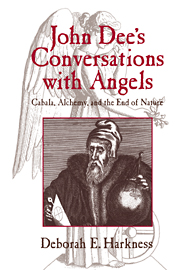Book contents
- Frontmatter
- Contents
- List of Illustrations
- Acknowledgments
- List of Abbreviations and Conventions
- Introduction
- Part I Genesis
- 1 The Colloquium of Angels: Prague, 1586
- 2 Building Jacob's Ladder: The Genesis of the Angel Conversations
- 3 Climbing Jacob's Ladder: Angelology as Natural Philosophy
- Part II Revelations
- Epilogue
- Select Bibliography
- Index
1 - The Colloquium of Angels: Prague, 1586
Published online by Cambridge University Press: 05 May 2013
- Frontmatter
- Contents
- List of Illustrations
- Acknowledgments
- List of Abbreviations and Conventions
- Introduction
- Part I Genesis
- 1 The Colloquium of Angels: Prague, 1586
- 2 Building Jacob's Ladder: The Genesis of the Angel Conversations
- 3 Climbing Jacob's Ladder: Angelology as Natural Philosophy
- Part II Revelations
- Epilogue
- Select Bibliography
- Index
Summary
A learned and renowned Englishman whose name was Dr. De[e]: came to Prague to see the Emperor Rudolf II and was at first wellreceived by him; he predicted that a miraculous reformation would presently come about in the Christian world and would prove the ruin not only of the city of Constantinople but of Rome also. These predictions he did not cease to spread among the populace.
Lutheran Budovec, Circulo horologi lunarisLutheran Budovec lived in Prague in the latter half of the sixteenth century, and when he noted in his journal the activities of John Dee he profiled a man far different from the “magus of Mortlake” with whom we are familiar. An ambassador, a popular prophet, and a religious rebel – all are suggested in Budovec's brief remarks, but the natural philosophical persona we have come to associate with Dee is absent. The link between Dee's personae, as outlined by Budovec, is communication, a side of Dee's life and activities explored only recently but which is emerging as an important feature of his enigmatic intellect. Recently described as an “arch-communicator” of ideas, Dee is beginning to be seen as both a contemplative natural philosopher and a vocal participant in the intellectual and cultural life of late-sixteenth-century Europe.
Such a combination of activity and contemplation can be seen vividly in the records Dee kept of his conversations with angels as well as the events that surrounded them.
- Type
- Chapter
- Information
- John Dee's Conversations with AngelsCabala, Alchemy, and the End of Nature, pp. 9 - 59Publisher: Cambridge University PressPrint publication year: 1999



